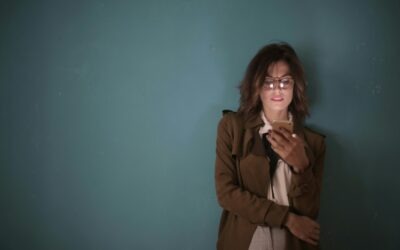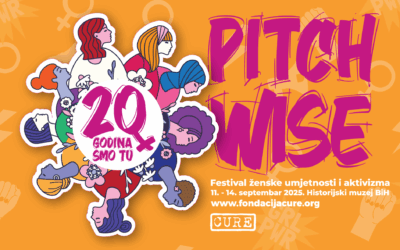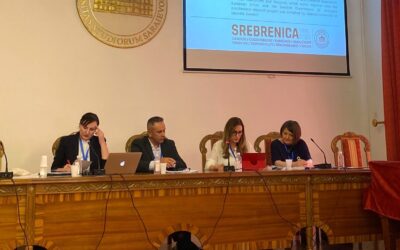I am a Master’s student in the United States, interning at CURE for the summer. During my time in Bosnia, I was able to visit Srebrenica, the town in which the worst massacre in Europe since WWII took place near the end of the war in Bosnia from 1992-1995. The Muslim men and boys of Srebrenica were slaughtered during the genocide, leaving the women and small children behind. Now, more than twenty years later, the widows and mothers still struggle to move on and make their way alone – without the men in their lives – in the extremely patriarchal society that still exists in rural Bosnia today.
According to the United Nations Development Programme (UNDP), 61 percent of the population lives in rural areas and Bosnia has the fourth highest rural population in Europe (following Montenegro, Ireland, and Finland). Women in these vast rural areas face specific challenges. “Stereotypical and traditional attitudes, customs and cultural practices are deeply rooted in the collective awareness of the role of women in the society, which are primarily seen as mothers, wives and housekeepers, as they ‘generously’ granted the role of ‘guardians’ of the family,” says Aleksandra Petrić in the Alternative Report on the Implementation of CEDAW and Women’s Human Rights in Bosnia and Herzegovina.
“Despite the fact that we live in the 21st century in a country governed by rule of law and democracy, somehow all that is only on paper, and it is obvious from the conditions in which women live,” writes Jovana B. in CURE’s publication “My Voice Echoes…” She continues, “In our society, especially in the rural areas, the status of women is very low.”
Life in the countryside is divided into the traditional gender roles mentioned above; the men work and the women care for the household. This means the work women are involved in is usually unpaid. They labor on family farms, cook, care for children, and other household activities. They have no income of their own, thus are reliant on the men in their families to provide for them. They may face social isolation and a lack of transportation. In addition, rural women have limited access to health care and education. A survey done by the UNDP found that 58 percent of rural households are more than 3 kilometers from the nearest medical facility. Girls are more likely than boys to drop out of school as children resulting in Bosnian women having around 15 percent less education than men.
All of this makes life in the countryside difficult for women already. Then add war. The widows of Srebrenica face additional challenges to those outlined above. According to “My Voice Echoes…” author Masha Durkalić, “it is not unusual to find an older women living alone, without a pension or any other regular financial aid. Their situation can often be even more difficult because of the fact that some of them are war returnees to their home towns and are additionally confronted with social isolation and the status of an ethnic minority.”
During the Srebrenica genocide, the Bosniak (Bosnian Muslim) men and boys were executed systematically by the invading Bosnian Serb army led by Radko Mladić. The Bosniak women and girls were pushed onto buses and sent away from Srebrenica and neighboring village of Potočari, glimpsing their husbands and sons for the last time as they were marched away.
After the genocide, many Serbs moved in to Srebrenica and Potočari, both now part of Republika Srpska. When women moved back to their homes, they found that everything had changed. They were now widowed, some childless, facing the double whammy of being without men in a male-dominated society and of being an ethnic minority. They were forced to adjust to a life they never expected.
I met two different rural women who told two very different stories who highlighted different sets of problems faced specifically by rural war widows returned to their homes. I do not know what their lives were like before, whether or not they faced any of the issues outlined above. What I do know is that they have lost and now find themselves without husbands or sons, left to mourn and carry on alone. These two women have chosen to cope with their loss in two very different ways. I want to tell both of their stories, as they were told to me.

The first rural woman I met was Saliha. She lives alone out in the countryside, far from the nearest town. Her house is large and white with a sprawling green garden outside and a long stone driveway even though she has no car. When we met, her female neighbors had come over to help her prepare a feast for our group of 18 people. Saliha loves feeding people. She loves visitors. Our numbers were no great obstacle to her. Tables were set up for us in the driveway and loaded with delicious Bosnian delights, my favorite of which were the sweet baklava and fresh mint lemonade. Saliha and her neighbors ensured we were well-fed and comfortable, ever the good hosts.
As the sun set on the beautiful evening and the mosquitoes started to come out, the mood began to change. The table was cleared, chairs were turned towards the doorstep where Saliha sat on a thin cushion that guarded her against the stone. It was time to hear her story. As a good friend of my program coordinator, she was very open and candid while speaking, never shying away from speaking plainly about how she has suffered.
She spoke of hardship, of war. Her husband and two sons were murdered in the Srebrenica genocide over twenty years ago. She returned after the war to live in the house they had once all shared, explaining that she could not imagine living anywhere else. The house is too big for one person, certainly, the property quite a lot to maintain. But this is where she wants to be, surrounded by the memories of her family or maybe haunted by their absence.

Saliha spends her days gardening, growing big, healthy vegetables with no one to eat them. This is a common problem faced by rural widows. Traditionally, their husbands would transport and sell the vegetables. Without a husband or sons and only cultivation skills, Saliha is unable to do much with those vegetables except feed herself and her guests. Still, she enjoys gardening and says she loses time out there. Tears form in her eyes when she talks of the pain she feels every day without her family.
Her strength is obvious in the way she holds herself, defiantly carrying on despite the obstacles she faces. She has managed to find joy in her quiet country life, maintaining her immaculate flowers, entertaining guests, building treasured relationships with those who are still in her life and refusing to fall into social isolation. She smiles, laughs and jokes, clearly admired by her neighbors. She certainly does not want anyone’s pity. Despite all of this, though, Saliha admits to us that really, she is just waiting to die.

The second widow from Srebrenica was Fazila, whose energy was in stark contrast to Saliha. This was perhaps because she did not know us as well and thus did not feel as comfortable describing her innermost pain. Or perhaps she simply has a different way of dealing with things. In any case, she focused on the positives when telling her story.
Before the war, Fazila worked in sales. She enjoyed keeping busy. When the war struck, she, like so many other women, lost the men in her family. Her husband and son were murdered around the same time as Saliha’s. Her daughter fled to Croatia and Fazila went to Germany to live with her sister. When she returned to Srebrenica to pick up the pieces of her life, she decided to start selling flowers. She lives in Potočari, close to the memorial. The flowers she grew and sold were placed on the white graves to honor those lost. “I was happy just to sell a few,” she said through an interpreter. “To make even ten marks.”
Using her good business sense, she decided to start her own shop, to help her heal. And so she opened a tiny store across from the Srebrenica memorial, where her husband and son are buried, along with Saliha’s husband and one of her sons. Now she sells flowers, souvenirs, and cold drinks to visitors at the memorial. She has worked for 10 years without a vacation, only doctor’s visits taking her away from her job. When she must see a doctor, she has to take two days off of work in order to travel all the way to Sarajevo, exemplifying the poor access to transportation and medical care faced by rural women.
Fazila is happy to be able to go on, to make her own living. She is proud that no one helps her or supports her. She has navigated a way to remain self-sufficient and broken down traditional gender barriers by becoming the owner of a shop and making her own money. As she speaks with me, her small shop is crowded and her round face glows with happiness as she interacts with the customers. Fazila says she feels fulfilled.

Fazila and Saliha went through the same struggles, both as rural women and war widows, both forced to navigate patriarchal society as single women. They have both managed to survive, honoring their lost loved ones in different ways. Their experiences, shared only briefly here, are reflected in many other rural widows. No or limited income, lack of transportation, large households to maintain alone, great distance from medical care, and social isolation are all very real issues to rural widows in Bosnia.
All this is not to paint them as helpless, however. Some organizations have been started, by women for women, to support and encourage rural women to heal and make an independent living. For example, the organization Snaga Žene started a project in Tuzla called “Flower Valley” which engages rural women in occupational therapy and economic empowerment by learning to grow and sell flowers. These sorts of initiatives are crucial in raising rural women to be on equal footing with men.
Other issues are addressed by CURE’s Selma Hadžihalilović in an annex to the Alternative Report on the Implementation of CEDAW and Women’s Human Rights in Bosnia and Herzegovina. She highlights the facts that rural women have no voice in community councils and educated women move to the city. Moreover, she says, “women cannot promote, protect or sell their products in local markets.” Saliha and her vegetables are a great example of this.
As far as raising the status of rural women, Selma makes some recommendations. She calls for the development of an action plan addressing sociopolitical engagement, rural agricultural industry and employment, rural tourism, IT technologies, environmental protection, education, health care and violence. Organizations like Snaga Žene are a good step towards supporting rural women. Saliha represents a lost opportunity, due to her situation, and Fazila represents one fortunate example of what women can do when they are empowered.
“Rural Development in Bosnia and Herzegovina: Myth and Reality.” UNDP. 2013. file:///C:/Users/Katie/Desktop/Grad%20School/BOSNIA/CURE/BiH_NHDR_Brochure_08072013.pdf
Petrić, Aleksandra. “Context.” Alternative Report on the Implementation of CEDAW and Women’s Rights in Bosnia and Herzegovina. 2010.
“Rural Development in Bosnia and Herzegovina: Myth and Reality.” UNDP. 2013. file:///C:/Users/Katie/Desktop/Grad%20School/BOSNIA/CURE/BiH_NHDR_Brochure_08072013.pdf


